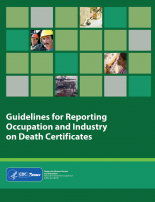National Occupational Mortality Surveillance (NOMS)
The following videos provide guidance for recording usual occupation and industry on death certificates.
Part 2: Defining Usual Occupation and Industry
Part 3: Common Occupation Responses and How to Improve Them
Part 4: Common Industry Responses and How to Improve Them
Part 6: Example: Looking at Occupation and Industry Over a Lifetime
Information for Funeral Directors
To ensure the best data are collected, it is important to
1) understand that occupation is different from industry,
2) collect usual occupation and corresponding industry, and
3) provide sufficient detail of the occupation and industry.
If the occupation and industry information on a death certificate is incomplete or inaccurate, researchers will not be able to correctly identify links between a cause of death and a specific occupation or industry.
Uses of Usual Occupation and Industry Information
- Detect new illnesses or injuries occurring in relation to specific industries or occupations.
- Monitor known associations between job hazards and illnesses (e.g., Black Lung Disease, once thought to be on the decline within the coal industry, reemerged in 2019).
- Calculate burden of illness for specific industries or occupations to prioritize research.
- Guide prevention efforts and more in-depth research on links between work and health.
Occupation Is Different From Industry
Occupation is what the person did for a living or the type of job they had—usually, this is the job title. Examples include architect, registered nurse, computer programmer, and medical laboratory technician, elementary school teacher, and auto mechanic.
Industry is the type of business or activity where the person worked. Industry pertains only to what the business does and not what the worker did at that business. Examples include a movie theater, an airline, a general hospital, a golf course, a high school, and a beer bottling facility.
Usual Occupation Is the Longest-held Occupation
Death certificates ask for USUAL occupation. Usual occupation is the job the person had the longest. This may not be their most recent or current occupation, or the one that paid the highest salary.
For more detailed information on collecting the best industry and occupation data, please see Guidelines for Reporting Occupation and Industry on Death Certificates, Español (Spanish).
The Guidelines also include examples of useful industry and occupation data entries.
The usual industry is the type of business associated with the usual occupation.
Get the Best Occupation and Industry Information
- Fill out the occupation and industry information for every decedent ever employed in their life. If you determine that they were never employed, please indicate “Never worked.”
- Do not enter retired or disabled.
- If a person was retired, that generally indicates they had an occupation at some point. Record the longest-held occupation and corresponding industry.
- People who had a disability often still worked with their disability or had a job before the disability. If having a disability prevented them from ever having a job, please enter “Never Worked.”
- It is better to ask what the decedent’s occupation was first and then ask their industry. This is because more people are familiar with a person’s job and may be confused about their industry.
- If you get a vague answer, follow-up with a prompt.
- For occupation, ask, “What was their job title?” or if they still provide a vague response like “consultant,” ask, “What type of consultant were they?”
- For industry, if they give a vague answer such as “business” or “manufacturing,” ask, “What type of business was it?” or “What did their company do or make?” Even “healthcare” is not quite specific enough. Ask “What type of healthcare? A hospital? A doctor’s office? A dentist’s office?”
- It is important to collect both occupation and industry.
Job hazards for the same occupation can vary depending on the industry where a person worked. Please do your best to get both.

